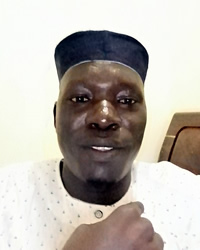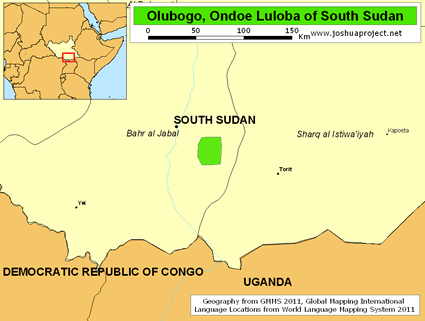The Olubogo, also known as Ondoe Luloba, Olubo, Lulba, or Oluboti, are an ethnic group residing primarily in Central Equatoria State of South Sudan, particularly southeast of Juba in the Lulba Hills area, with their main town being Lokiliri. Some members of the group also live in Eastern Equatoria State. Their language, Olu'bo, is part of the Central Sudanic branch of the Nilo-Saharan language family and is spoken by approximately 33,000 people in South Sudan.Historically, the Olubogo have maintained a distinct identity within the Sudanic people cluster. Their cultural and linguistic heritage is deeply rooted in the region, though they share affinities with other Sub-Saharan African groups. Despite their long-standing presence, they remain largely unreached and unengaged in terms of Christian mission efforts.
The Olubogo live in rural communities where agriculture is the primary livelihood. They cultivate crops such as sorghum, maize, and cassava, and raise livestock including goats and chickens. Their settlements are typically small and scattered, with limited infrastructure and access to services.Social life is organized around clan structures, and elders play a central role in decision-making and conflict resolution. Traditional customs and oral storytelling are vital to preserving their heritage. Due to geographic isolation and underdevelopment, many Olubogo communities lack access to formal education, healthcare, and clean water.
The majority of Olubogo people practice Sunni Islam, which accounts for approximately 70% of the population. Islam was introduced through regional trade and missionary efforts and has become deeply embedded in their religious identity. A minority—between 10% and 50%—identify as Christian, though only 2–5% are considered evangelical believers.Traditional beliefs and practices may still influence daily life, especially in rural areas. There is little history of sustained Christian engagement, and syncretism between Islam and indigenous spiritual practices is not uncommon.
The Olubogo people face several critical needs, including the absence of a Bible translation in the Olu'bo language, which limits access to Scripture for both Christians and seekers. Additionally, Christian media such as the Jesus Film and radio broadcasts are unavailable in Olu'bo, making it challenging to share the gospel through accessible formats. There are also few trained Christian leaders among the Olubogo, resulting in minimal discipleship and church-planting efforts. Beyond spiritual needs, many communities lack basic education, healthcare facilities, and clean water, contributing to poverty and preventable diseases. Finally, with Islam as the dominant religion, there is a vital need for culturally sensitive evangelism and meaningful interfaith dialogue.
Please pray for the translation of the Bible into Olu'bo, so that the Olubogo may hear God's Word in their heart language. Ask God to raise up workers who will live among the Olubogo, sharing the gospel with love and humility. Pray for spiritual openness within Muslim communities and for respectful conversations about Jesus. Intercede for the development of Christian media resources—such as audio recordings, films, and radio—in Olu'bo. Finally, pray for healing and hope in communities burdened by poverty, isolation, and lack of basic services.
Scripture Prayers for the Olubogo, Ondoe Luloba in South Sudan.
PeopleGroups.org: Olubogo
| Profile Source: Joshua Project |












